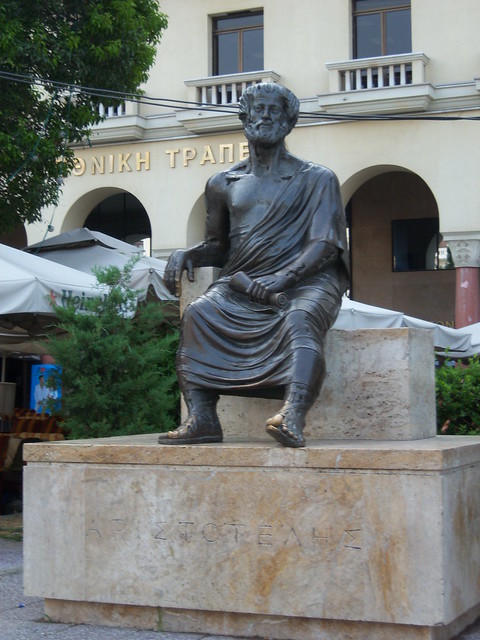 |
| Aristotle in Thessalonica |
Paul and Silas traveled through the cities of Amphipolis and Apollonia and came to the city of Thessalonica, where there was a synagogue. As usual, Paul went into the synagogue. On three consecutive days of worship, he had discussions about Scripture with the synagogue members. He explained and showed them that the Messiah had to suffer, die, and come back to life, and that Jesus, the person he talked about, was this Messiah. Some of the Jews were persuaded to join Paul and Silas, especially a large group of Greeks who had converted to Judaism and the wives of many prominent men.
Then the Jews became jealous. They took some low-class characters who hung around the public square, formed a mob, and started a riot in the city. They attacked Jason’s home and searched it for Paul and Silas in order to bring them out to the crowd. When they didn’t find Paul and Silas, they dragged Jason and some other believers in front of the city officials. They shouted, “Those men who have made trouble all over the world are now here in Thessalonica, and Jason has welcomed them as his guests. All of them oppose the emperor’s decrees by saying that there is another king, whose name is Jesus.” The crowd and the officials were upset when they heard this. But after they had made Jason and the others post bond, they let them go. Immediately when night came, the believers sent Paul and Silas to the city of Berea.
1) What do you notice about this story?
Two books of the New Testament are Paul’s letters to these believers, called 1st and 2nd Thessalonians. Paul often wrote and spoke of how soon the Lord was returning, and the Thessalonians thought he meant before anybody died. So when people died … they were worried. Paul reassures them of their faith, and then comforts them about the last day.
1 Thessalonians 1:6-8
In spite of a lot of suffering, you welcomed God’s word with the kind of joy that the Holy Spirit gives. This way, you became a model for all the believers in the province of Macedonia and Greece. From you the Lord’s word has spread out not only through the province of Macedonia and Greece but also to people everywhere who have heard about your faith in God. We don’t need to say a thing about it.
2) Why would they be doubting their faith? Would this be reassuring to people doubting their faith?
1 Thessalonians 4:13-18
Brothers and sisters, we don’t want you to be ignorant about those who have died. We don’t want you to grieve like other people who have no hope. We believe that Jesus died and came back to life. We also believe that, through Jesus, God will bring back those who have died. They will come back with Jesus. We are telling you what the Lord taught. We who are still alive when the Lord comes will not go into his kingdom ahead of those who have already died. The Lord will come from heaven with a command, with the voice of the archangel, and with the trumpet call of God. First, the dead who believed in Christ will come back to life. Then, together with them, we who are still alive will be taken in the clouds to meet the Lord in the air. In this way we will always be with the Lord. So then, comfort each other with these words!
3) Whoa! That’s a pretty direct description of the end. What do you think?
1 Thessalonians 5:1…6
Brothers and sisters, you don’t need anyone to write to you about times and dates. You know very well that the day of the Lord will come like a thief in the night. … That day won’t take you by surprise as a thief would. You belong to the day and the light not to the night and the dark. Therefore, we must not fall asleep like other people, but we must stay awake and be sober.
4) This fits what Jesus says about the day of the Lord, also. Some people think about this as talking about how no one knows the length of their own life, and some people think it’s about the end of history. Either way, why does it matter that it’s a surprise?
1 Thessalonians 5:14-15
We encourage you, brothers and sisters, to instruct those who are not living right, cheer up those who are discouraged, help the weak, and be patient with everyone. Make sure that no one ever pays back one wrong with another wrong. Instead, always try to do what is good for each other and everyone else.
5) That’s pretty direct advice. Have you done any of those things? Can you think of any opportunities you’ve had to do them?
2 Thessalonians 2:1-3, 8
Brothers and sisters, we have this request to make of you about our Lord Jesus Christ’s coming and our gathering to meet him. Don’t get upset right away or alarmed when someone claims that we said through some spirit, conversation, or letter that the day of the Lord has already come. Don’t let anyone deceive you about this in any way. That day cannot come unless a revolt takes place first, and the man of sin, the man of destruction, is revealed. … Then the man of sin will be revealed and the Lord Jesus will destroy him by what he says. When the Lord Jesus comes, his appearance will put an end to this man.
6) Double whoa! That’s a description of what some people refer to as the Antichrist. Does it seem possible that some person could deceive that many people? Does Paul think we need to worry about it?
2 Thessalonians 3:8-13
We lived a disciplined life among you. We didn’t eat anyone’s food without paying for it. Instead, we worked hard and struggled night and day in order not to be a burden to any of you. It’s not as though we didn’t have a right to receive support. Rather, we wanted to set an example for you to follow. While we were with you, we gave you the order: “Whoever doesn’t want to work shouldn’t be allowed to eat.”
7) What does working hard have to do with your spiritual life?
We hear that some of you are not living disciplined lives. You’re not working, so you go around interfering in other people’s lives. We order and encourage such people by the Lord Jesus Christ to pay attention to their own work so they can support themselves. Brothers and sisters, we can’t allow ourselves to get tired of doing what is right.
EDIT:
The morning of the study this question occurred to me, and it was fruitful with the students.
8) What are the things that might make Christians discouraged in their faith nowadays? What might Paul write to them?
The what-Paul-might-write was our jot down reflection of the week.
Then we tried inventing a card game to go with the gospel story of the wise and foolish bridesmaids - but that's clearly another post for another day.
Image credits: Classical languages, Share the Word @ Flickr

No comments:
Post a Comment